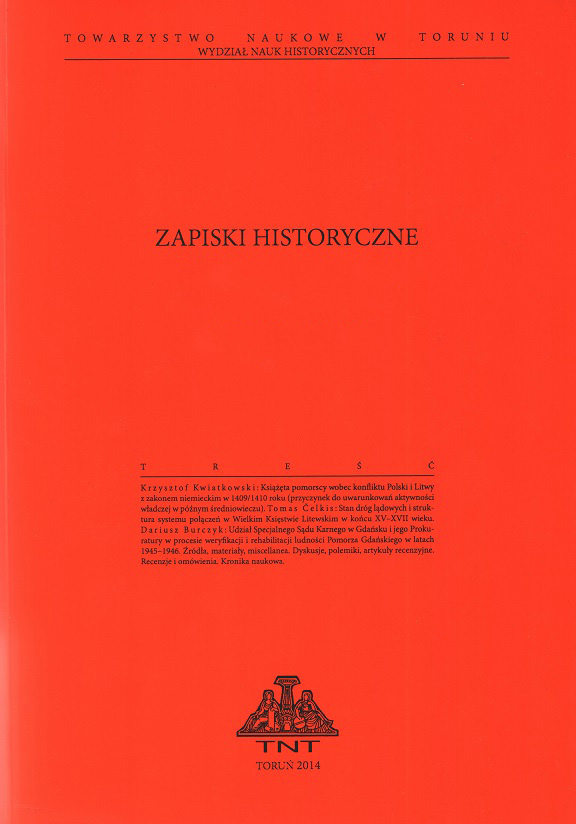Ivan Ivanovich Lappo’s Views on the Circumstances of Establishing the Union of Lublin in the Context of Pre-Revolutionary Russian Historiography
Ivan Ivanovich Lappo’s Views on the Circumstances of Establishing the Union of Lublin in the Context of Pre-Revolutionary Russian Historiography
Author(s): Tomasz AmbroziakSubject(s): Cultural history, History of ideas, 19th Century, Pre-WW I & WW I (1900 -1919), Historical revisionism
Published by: Towarzystwo Naukowe w Toruniu
Keywords: Polish-Lithuanian Commonwealth; Grand Duchy of Lithuania; Union of Lublin; Ivan Ivanovich Lappo; Russian historiography;history of historiography;
Summary/Abstract: The aim of the article is to analyze the views of Ivan Ivanovich Lappo regarding the circumstances of the conclusion of the Union of Lublin. The opinions of this historian were presented in the context of the views of Russian pre-revolutionary historiography, especially of such authors as Nikolay Gerasimovich Ustryalov, Mikhail Osipovich Koyalovich, Nikolay Alexeyevich Maksimieyko, Matvey Kuzmich Lyubavskiy and Fedor Ivanovich Leontovich. The article belongs to the vast area of studies on the history of historiography, the undertaking of which allows the assessment of the current scholarly achievements and research methodology, and thus making new research postulates. It should be noted that, despite some evolution, the fundamental assessment of the Union of Lublin in Russian pre-revolutionary historiography remained negative. However, the circumstances and reasons for its conclusion were perceived differently. Although the description of the conclusion of the Union of Lublin was not the main research goal for I. Lappo, he carried out a fairly detailed reconstruction of the Sejm of Lublin and the circumstances of the conclusion of the Polish-Lithuanian union in 1569. It seems that the aim of such a procedure was not only to explain the attitude of Lithuanians towards Poles and the legal relationship between the Grand Duchy and the Crown, but first of all to support of the historian’s fundamental thesis that, as a result of the Union of Lublin, the Grand Duchy did not lose its independence and distinctiveness. This historian not only reported the course of the Sejm of Lublin and the decision of the Act of the Union of July 1, but also confronted the views of Poles and Lithuanians concerning the conditions of the Union and the way it was concluded. According to him, the historical reality and the political system of the Grand Duchy until 1569 corresponded to the project of a union presented by Lithuanians. In his opinion, the aim of Poles was not to bring about real unification based on the principles of equality and fraternity, but to force Lithuanians to enter into a union through the implementation of old rights and privileges. In some parts of his research, however, the scholar differentiated between the radical attitude of the Chamber of Deputies of the Crown and the more conciliatory position of the Senate. The description of King Sigismund Augustus’s activities presented by I. Lappo turned out to be quite paradoxical and partly incoherent. On the one hand, the historian claimed that the monarch was under the influence of Poles and betrayed the Grand Duchy. On the other hand, he quoted a number of cases in which the king’s attitude contradicted this general opinion. Lappo’s general attitude towards the Union of Lublin remained negative. The historian clearly sympathized with Lithuanians, seeing Poles as merely caring for their own interests to the detriment of the Grand Duchy. The analysis of Lappo’s views made in this article shows that there are elements in his concepts that testify to the connection with the traditional narrative of Russian historiography, as well as new and original ideas.
Journal: Zapiski Historyczne
- Issue Year: 84/2019
- Issue No: 4
- Page Range: 97-122
- Page Count: 26
- Language: English

